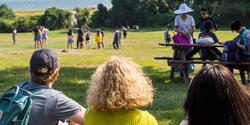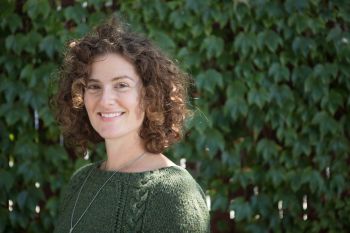On Work-Life Balance

"overwork and burnout are certainly no myths, as we see among ourselves and our students, and the idea of taking care of myself and loved ones as another task for this spinning plates routine sometimes feels like just another opportunity to fail at balance. But listening to fellow faculty’s approaches for finding sustainable equilibrium for work reinforced how much I learn from my colleagues, and how much our collective wisdom has shaped my pedagogy and how I do my work."
by Liz Maynard, Faculty Coordinator, Teaching & Learning Lab

Autumn always feels like the beginning of the year, maybe because the weather change is so palpable, or the ingrained rhythms of the “back-to-school” season, but most of all because we get to welcome all these new folks to RISD.
Before the official start of the semester, I was invited to host a brief conversation on “work-life balance” for the New Faculty Orientation – a recent community-driven turn towards a cohort system for folks joining full-time faculty. We quickly came to the collective conclusion that this balance is something of a myth: the varied cycles of the year demand more of us at certain times than others, and balance isn’t something we find, but an endless process of calibrating and recalibrating to the tasks of the present moment (while also tending to our human-animal needs). Overwork and burnout are certainly no myths, as we see among ourselves and our students, and the idea of taking care of myself and loved ones as another task for this spinning plates routine sometimes feels like just another opportunity to fail at balance. But listening to fellow faculty’s approaches for finding sustainable equilibrium for work reinforced how much I learn from my colleagues, and how much our collective wisdom has shaped my pedagogy and how I do my work.
In 2019 I started teaching an experimental Academic Enrichment course I titled “Epistemologies of (Self)-Care,” developed in-part as a response to the collective cost to the RISD community of a grueling pace that can privilege rigor over comprehension, production over embodied learning. Our touchstone for the course are the oft-repeated (and misapplied) words of queer Black feminist poet and activist Audre Lorde: “Caring for myself is not self-indulgence, it is self-preservation, and that is an act of political warfare.” Lorde’s quote, from the epilogue of The Cancer Journals (1987), points to the way that structural forces dictate available resources–she specifically cites funding cuts of NIH research into cancer treatments–and that systems driven by extraction and production do not make room for care (and are not terribly concerned with balance). Each wintersession, we contextualize art practices and historical moments within the frames of mutual aid and reciprocity, and explore the boundless possibilities embedded in both joy and failure. Together, we make room to reflect on our experiences of teaching and learning and to experiment with embodied pedagogies that do make room for the vicissitudes of life. It is always a relief.
What I have learned about work-life balance in eighteen years of teaching is that it is a practice like any other. My own experiences as a student in academia led me to pursue a range of somatic work as ballast to the so-called “life of the mind.” While I’m always excited to chat about the myriad benefits of rock climbing or partner dancing or singing to the ocean, it’s with equal delight that I take on this role as the faculty coordinator of the Teaching & Learning Lab with the primary goal of making your work feel lighter.
The Teaching & Learning Lab offers itself up in the spirit of resource – not in the sense of material to be extracted, but in the sense of that which is resourcing, that which increases our collective capacity. Our aim is not to add another spinning plate to your juggling act, but to be a space for engaging your teaching practice in a way that makes it easier. Feeling unsure about what learning outcomes even mean on a syllabus? Grappling with how to confront the specter of AI without shaming or alienating your students? Nervous about cultivating an open and productive critique? Your colleagues are here to help. Teaching is the throughline that connects all faculty here at RISD, and as a community of designers, thinkers, and makers, we have a wealth of perspectives and techniques to support the necessary friction of learning. Surely it will be easier together.
Related resources:
Marter, J., 2023. "How to set healthy boundaries at work,"
https://www.choosingtherapy.com/setting-boundaries-at-work/
Lemon, N. (Ed.). (2024). Prioritising Wellbeing and Self-Care in Higher Education: How We Can Do Things Differently to Disrupt Silence (1st ed.). Routledge. https://doi.org/10.4324/9781003457510
Berila, Beth. Integrating Mindfulness into Anti-Oppression Pedagogy, 2nd edition. New York: Routledge, 2024. https://www.routledge.com/Integrating-Mindfulness-into-Anti-Oppression-Pedagogy-Social-Justice-in-Higher-Education/Berila/p/book/9781032044576
Liz Maynard, Faculty Coordinator, Teaching & Learning Lab
September 26, 2025